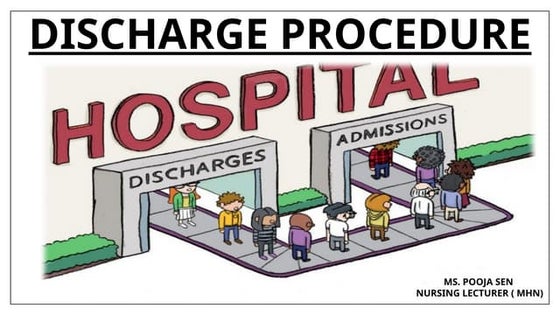Power of Habits.pptx
Download as PPTX, PDF0 likes45 views
Habits are like soft beds, easy to get in, difficult to get out. Change your habits, to change your destiny for better.
1 of 12
Download to read offline
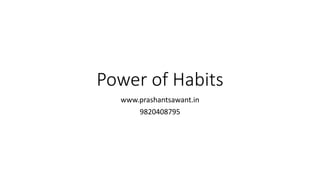


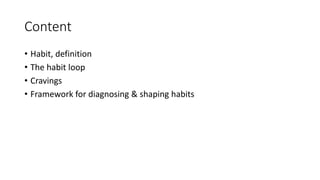


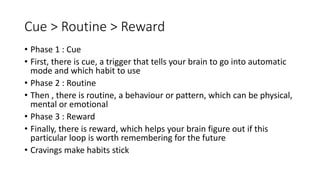





Recommended
Change is a process



Change is a processNutrition Camp
Ěý
By understanding the process of how individuals change their behaviours, the likelihood of them making and keeping the change is much higher. One Change Club Workshop



One Change Club WorkshopSteve Schlafman
Ěý
This document outlines an agenda and materials for a workshop called One Change Club aimed at helping participants build good habits, one at a time. The agenda includes sections on change, self-awareness, motivation, habits, tips for forming new habits, and creating a 30 day plan. Key points include that change is difficult but possible with small steps and persistence, the importance of self-awareness and acceptance in driving change, using intrinsic motivation and tiny habits to form new behaviors, and providing support and accountability over 30 days to help participants achieve their goals.11. lesson 10 conclusion and homework



11. lesson 10 conclusion and homeworkDan Cheung
Ěý
This module taught strategies for cutting calories through eating habits like having regular meals, using smaller plates, eating slowly, shopping the perimeter of the grocery store, snacking on protein, and drinking more water. It discussed finding motivation, portion control, moderation, and allowing treats occasionally. The next module will cover emotional eating triggers and maintaining weight loss long term. Learners are asked to reflect on their reasons for weight loss, visualize their goal, identify easy calorie cutting strategies, and consider asking a friend to be a weight loss buddy.11. lesson 10 conclusion and homework



11. lesson 10 conclusion and homeworkDan Cheung
Ěý
This module taught strategies for cutting calories through eating habits like having regular meals, using smaller plates, slowing down while eating, shopping the grocery store perimeter, including protein in snacks, and getting enough sleep. It discussed finding motivation, portion control, and managing drinks. While some strategies like moderation of wine and chocolate were presented, the focus is on developing habits for a healthy lifestyle and weight loss. The next module will cover emotional triggers and maintaining weight loss goals.Change Psychology



Change PsychologyRichard Yi
Ěý
This document provides an overview of change psychology and how to effectively change behaviors. It discusses the three pillars of change psychology: neuroplasticity, beliefs and schemas, and accepting failure with a growth mindset. It outlines the six stages of behavior change: pre-contemplation, contemplation, preparation, action, maintenance, and potential relapse. Tools for change like writing, exercise, and meditation are also presented. The document emphasizes that change is a gradual process and recommends focusing on simplicity rather than trying to change everything at once.Neuroplasticity and the Science of Habit Formation, Case Study ZenFriend.com



Neuroplasticity and the Science of Habit Formation, Case Study ZenFriend.comRemo Uherek
Ěý
This document discusses tapping into neuroplasticity and habit change through meditation. It provides an overview of neuroplasticity and how habits are formed through cues, routines, and rewards. Meditation is presented as a way to change habits by utilizing neuroplasticity. Research on meditation is summarized that shows it can increase focus, attention, and positively impact brain activity and structure. Microhabits and small wins are presented as effective strategies for habit change supported by meditation.Seven little habits



Seven little habitsMohit Singla
Ěý
This document discusses how developing good habits can change your life. It defines a habit as an activity that is acquired, done frequently, done automatically, and difficult to stop. The document recommends focusing on developing one positive habit at a time through a 30-day challenge. Some highlighted habits include positive thinking, exercise, single-tasking, focusing on one goal, eliminating non-essentials, kindness, and creating a daily routine. Developing these habits can help simplify your life and focus on what's important.Habits? What, Why and How



Habits? What, Why and Howjuanico92
Ěý
Presentation for Oral Communication class, describing what is a Habit, why we should start creating new ones, and how to do it. Provide Tips and Examples of habits.Ditch Unhealthy Habits, Permanently



Ditch Unhealthy Habits, PermanentlySummit Health
Ěý
You know what you need to do to have a healthier
life, but you just can’t seem to make the changes to
get you there. Our specialists offer insight into how
good and bad habits are formed, and how to turn
things around. (Hint: You don’t need to change
everything at once.)Alison Canavan. , Be Complete



Alison Canavan. , Be CompleteInvestnet
Ěý
The document discusses the author's struggle with depression and anxiety. It argues that modern society is making people physically, mentally, emotionally and spiritually unwell due to poor lifestyle choices like unhealthy diets, lack of exercise, and lack of self-care. The author advocates improving well-being through daily habits like meditation, gratitude journaling, healthy eating, exercise, and nurturing relationships. The overall message is that small lifestyle changes can significantly improve mood, mental health, and quality of life.Neuroscience of Self Change 



Neuroscience of Self Change Matt Kendall
Ěý
Dr. Gabija Toleikyte presented on the neuroscience of self change. She discussed how the brain is made up of the lizard brain, mammal brain, and human brain, with each area having different functions and energy consumption. Habits are formed through cue, routine, and reward loops in the mammal brain. To create lasting change, one must implement changes in small steps to avoid stress, regularly reward the new routine, and maintain the change for 1-3 months to form new neural networks. Stress can push the brain back into old patterns, so managing stress response is important for change.Stress Management - Everyone knows what stress is, but no one really knows



Stress Management - Everyone knows what stress is, but no one really knowsDr.Laxmi Agrawal Shrikhande
Ěý
Stress is the reaction people have to excessive pressures or other types of demands placed upon them.
It arises when they worry that they can’t cope.Good Habits are Easy to Make!



Good Habits are Easy to Make!Jim Jubelirer
Ěý
Jim Jubelirer hosted a First Fridays event about habits. The event provided an overview of Jim's background and coaching experience. It discussed ActionCOACH's mission to achieve world abundance through business re-education. Various coaching programs and upcoming events were described. The bulk of the document discussed habits and habit loops, explaining how habits are formed and can be changed. It covered concepts like keystone habits, small wins, the power of belief, and overcoming distractions. Tools for habit change like journaling and brainwave entrainment were also mentioned.Change Your Habits, Change Your Life



Change Your Habits, Change Your LifeBob Proctor
Ěý
Download a free copy of my book, You Were Born Rich > http://bit.ly/1TOvxjJ
www.proctorgallagherinstitute.com
You must change your habits to change your life. Discover the one thing everyone must change to achieve the three things that most people want: (1) to be free of any financial concerns, (2) wake up every morning enthused about how they are going to spend the day and (3) enjoy daily relationships with people who are upbeat, enthusiastic and creatively productive. Creating and Maintaining Natural Confidence



Creating and Maintaining Natural ConfidenceMatt Kendall
Ěý
- The document provides information on developing self-confidence and managing anxiety, covering topics like causes of low self-confidence, self-esteem, cognitive models of anxiety, lifestyle factors, social life, and techniques for managing anxiety and negative thoughts.
- Specific techniques taught include using a negative thought table to evaluate fears and self-talk, creating an anxiety hierarchy to gradually face fears from lowest to highest, and discrete exercises that can be done in public to manage physical anxiety.
- The overall message is that readers can gain confidence and manage anxiety by understanding their thoughts and behaviors, preparing for social situations, maintaining a healthy lifestyle, and using practical techniques to evaluate and address fears and physical symptoms.Eat, Move, Be Happy



Eat, Move, Be HappyInnerHelper
Ěý
This document provides guidance and techniques for continuing weight management efforts using self-suggestion. It encourages the reader to practice techniques learned from the program regularly, especially in challenging situations involving food. Reviewing lessons, asking for guidance from their "inner helper", and finding an accountability partner can help with long-term success. The overall message is that the reader now has tools to feel in control of their health and weight for life.Importance of Exercise with Diabetes



Importance of Exercise with DiabetesElijah Bancroft
Ěý
This document discusses the importance of exercise for managing diabetes. It notes that exercise can lower blood sugar, increase insulin sensitivity, reduce medication needs, and even potentially reverse diabetes symptoms. Structured aerobic and resistance exercise just three times per week can lower A1C by an average of 0.67% in three months. The document outlines barriers to exercise and provides seven strategies to overcome them, such as finding enjoyable activities and developing a reasonable exercise plan. It emphasizes setting specific, measurable, attainable, realistic, and time-bound goals to stay motivated.Days to form a Habit



Days to form a HabitProf Ansari
Ěý
changing habits changing lives and charles duhigg the power of habit summary and describe some personal habits that are important to youHow To Be A Healthy Writer



How To Be A Healthy WriterKim Foster
Ěý
This document provides strategies for writers to maintain physical and mental health. It discusses common health issues writers face such as sedentary lifestyles and stress, and provides solutions like exercising regularly, eating nutritious snacks, practicing good ergonomics, managing stress through meditation, getting quality sleep, and avoiding unhealthy substances. The goal is to help writers lead healthy lifestyles to avoid illness and injuries that could prevent them from writing.Keeping a Record



Keeping a RecordInnerHelper
Ěý
This document discusses keeping a record of food intake as a form of self-suggestion that can influence eating habits. It notes that all that is required is to record what is eaten without needing to change patterns yet. Keeping an accurate record increases self-awareness of food choices and gets the "thinking" parts of the brain involved to encourage resisting unhealthy foods and making better choices. Over time, the record can become an "inner ally" that supports the desire to change eating behaviors.discover the key to burning more calories



discover the key to burning more caloriesDan Cheung
Ěý
This document introduces strategies for burning more calories through constant small movements and fidgeting throughout the day. It recommends practicing fidgeting while sitting, standing, or walking, as research shows fidgeting can burn up to 154% more calories than sitting still. The key is finding excuses to move more regularly, such as walking during breaks or standing while waiting. Making small adjustments like fidgeting or moving more within daily routines can help burn additional calories without a major time commitment to formal exercise. The lesson encourages the reader to identify 3 daily activities they can modify to incorporate more movement.The fabulous new you 1



The fabulous new you 1Lisa Meisels
Ěý
The document outlines a transformation formula for weight loss and improved well-being. It discusses how people often fail to achieve their goals due to lack of commitment and action. The formula teaches strategies to overcome emotional eating triggers, including observing one's behaviors detachedly, identifying the emotions behind food actions, and using alternatives like photos, exercise, or music to stabilize emotions without eating. Mastering this helps balance the brain and control food behaviors for long-term transformation.The fabulous new you 1



The fabulous new you 1Lisa Meisels
Ěý
The document outlines a transformation formula for weight loss and improved well-being. It discusses how emotional eating can become ingrained, leading to overeating and weight gain. The formula teaches the reader to observe their eating behaviors objectively, identify the emotions triggering overeating, and use alternative activities like photos, exercise or music to stabilize emotions without using food. Mastering this strategy of addressing the emotional drivers of eating habits is positioned as the first key to success with the transformation process.recap and take action



recap and take actionDan Cheung
Ěý
This document recaps Module 2 of a weight loss course which taught strategies for coping with eating triggers, curbing hunger, increasing self-control, and developing a mindset for long-term weight maintenance. It encourages the learner to reflect on their most challenging eating trigger and create a plan to address it. Finally, it prompts the learner to consider questions about improving their sleep, managing stress, and setting incremental weight loss goals with rewards.5 Rapid Fat Loss Plan Tips



5 Rapid Fat Loss Plan TipsVMorris810
Ěý
5 Rapid Fat Loss Plan Tips
There are multiple approaches to personal weight loss goals.
Each approach has it’s own unique way of working with the body to lose fat.PERSONAL WELLBEING.pptx



PERSONAL WELLBEING.pptxCheifLawInstructor
Ěý
This document discusses personal wellbeing and productivity. It addresses the six dimensions of wellness: emotional, social, physical, occupational, intellectual, and spiritual. It emphasizes the importance of balancing these different areas of life. It provides tips for how to examine your routine, reset priorities, spend time wisely, and ask yourself questions to maintain balance and focus on overall wellbeing and productivity.How to manage shiftwork



How to manage shiftworkMohammed Rajab
Ěý
This document provides tips for managing shift work including maintaining a healthy lifestyle with proper diet, exercise, and sleep. It suggests establishing routines, avoiding late night meals, limiting caffeine and alcohol, and maintaining communication with family. The document also advises seeking help from supervisors or medical professionals if having difficulty adjusting to shift work.kaizen strategies.pdf strategies and application



kaizen strategies.pdf strategies and applicationeman youssif
Ěý
Kaizen is all about practical, actionable strategies that focus on small, incremental changes to achieve continuous improvement. Here’s a detailed breakdown of some key Kaizen strategies that you can apply in your personal life, work, or habitsFire financial independence & retire early, by Prashant Sawant



Fire financial independence & retire early, by Prashant SawantPrashant Sawant
Ěý
The document discusses the book "Your Money or Your Life" by Vicki Robin and the FIRE (Financial Independence, Retire Early) movement. It provides information on retirement calculators, savings rates, ESI (Earn, Save, Invest) in LIC, the three components of FIRE (Fat fire, Lean fire, and Barista fire), and advertising various financial courses offered by Prashant Sawant on Fridays and Saturdays for Rs. 9990-9999."Recruitment of MDRT agents" by Prashant Sawant



"Recruitment of MDRT agents" by Prashant SawantPrashant Sawant
Ěý
This document discusses strategies for recruiting agents to become members of MDRT, an association that recognizes high-achieving life insurance agents. Some key advantages of MDRT membership include recognition within the life insurance company and from clients. The document provides tips on targeting candidates from various professions and strategies for pitching MDRT to probables. It also outlines a USA strategy and challenges of recruiting from visa consultants. Finally, it identifies characteristics of successful MDRT agents as having a burning desire, the right attitude, being a good student, and consistency.More Related Content
Similar to Power of Habits.pptx (20)
Ditch Unhealthy Habits, Permanently



Ditch Unhealthy Habits, PermanentlySummit Health
Ěý
You know what you need to do to have a healthier
life, but you just can’t seem to make the changes to
get you there. Our specialists offer insight into how
good and bad habits are formed, and how to turn
things around. (Hint: You don’t need to change
everything at once.)Alison Canavan. , Be Complete



Alison Canavan. , Be CompleteInvestnet
Ěý
The document discusses the author's struggle with depression and anxiety. It argues that modern society is making people physically, mentally, emotionally and spiritually unwell due to poor lifestyle choices like unhealthy diets, lack of exercise, and lack of self-care. The author advocates improving well-being through daily habits like meditation, gratitude journaling, healthy eating, exercise, and nurturing relationships. The overall message is that small lifestyle changes can significantly improve mood, mental health, and quality of life.Neuroscience of Self Change 



Neuroscience of Self Change Matt Kendall
Ěý
Dr. Gabija Toleikyte presented on the neuroscience of self change. She discussed how the brain is made up of the lizard brain, mammal brain, and human brain, with each area having different functions and energy consumption. Habits are formed through cue, routine, and reward loops in the mammal brain. To create lasting change, one must implement changes in small steps to avoid stress, regularly reward the new routine, and maintain the change for 1-3 months to form new neural networks. Stress can push the brain back into old patterns, so managing stress response is important for change.Stress Management - Everyone knows what stress is, but no one really knows



Stress Management - Everyone knows what stress is, but no one really knowsDr.Laxmi Agrawal Shrikhande
Ěý
Stress is the reaction people have to excessive pressures or other types of demands placed upon them.
It arises when they worry that they can’t cope.Good Habits are Easy to Make!



Good Habits are Easy to Make!Jim Jubelirer
Ěý
Jim Jubelirer hosted a First Fridays event about habits. The event provided an overview of Jim's background and coaching experience. It discussed ActionCOACH's mission to achieve world abundance through business re-education. Various coaching programs and upcoming events were described. The bulk of the document discussed habits and habit loops, explaining how habits are formed and can be changed. It covered concepts like keystone habits, small wins, the power of belief, and overcoming distractions. Tools for habit change like journaling and brainwave entrainment were also mentioned.Change Your Habits, Change Your Life



Change Your Habits, Change Your LifeBob Proctor
Ěý
Download a free copy of my book, You Were Born Rich > http://bit.ly/1TOvxjJ
www.proctorgallagherinstitute.com
You must change your habits to change your life. Discover the one thing everyone must change to achieve the three things that most people want: (1) to be free of any financial concerns, (2) wake up every morning enthused about how they are going to spend the day and (3) enjoy daily relationships with people who are upbeat, enthusiastic and creatively productive. Creating and Maintaining Natural Confidence



Creating and Maintaining Natural ConfidenceMatt Kendall
Ěý
- The document provides information on developing self-confidence and managing anxiety, covering topics like causes of low self-confidence, self-esteem, cognitive models of anxiety, lifestyle factors, social life, and techniques for managing anxiety and negative thoughts.
- Specific techniques taught include using a negative thought table to evaluate fears and self-talk, creating an anxiety hierarchy to gradually face fears from lowest to highest, and discrete exercises that can be done in public to manage physical anxiety.
- The overall message is that readers can gain confidence and manage anxiety by understanding their thoughts and behaviors, preparing for social situations, maintaining a healthy lifestyle, and using practical techniques to evaluate and address fears and physical symptoms.Eat, Move, Be Happy



Eat, Move, Be HappyInnerHelper
Ěý
This document provides guidance and techniques for continuing weight management efforts using self-suggestion. It encourages the reader to practice techniques learned from the program regularly, especially in challenging situations involving food. Reviewing lessons, asking for guidance from their "inner helper", and finding an accountability partner can help with long-term success. The overall message is that the reader now has tools to feel in control of their health and weight for life.Importance of Exercise with Diabetes



Importance of Exercise with DiabetesElijah Bancroft
Ěý
This document discusses the importance of exercise for managing diabetes. It notes that exercise can lower blood sugar, increase insulin sensitivity, reduce medication needs, and even potentially reverse diabetes symptoms. Structured aerobic and resistance exercise just three times per week can lower A1C by an average of 0.67% in three months. The document outlines barriers to exercise and provides seven strategies to overcome them, such as finding enjoyable activities and developing a reasonable exercise plan. It emphasizes setting specific, measurable, attainable, realistic, and time-bound goals to stay motivated.Days to form a Habit



Days to form a HabitProf Ansari
Ěý
changing habits changing lives and charles duhigg the power of habit summary and describe some personal habits that are important to youHow To Be A Healthy Writer



How To Be A Healthy WriterKim Foster
Ěý
This document provides strategies for writers to maintain physical and mental health. It discusses common health issues writers face such as sedentary lifestyles and stress, and provides solutions like exercising regularly, eating nutritious snacks, practicing good ergonomics, managing stress through meditation, getting quality sleep, and avoiding unhealthy substances. The goal is to help writers lead healthy lifestyles to avoid illness and injuries that could prevent them from writing.Keeping a Record



Keeping a RecordInnerHelper
Ěý
This document discusses keeping a record of food intake as a form of self-suggestion that can influence eating habits. It notes that all that is required is to record what is eaten without needing to change patterns yet. Keeping an accurate record increases self-awareness of food choices and gets the "thinking" parts of the brain involved to encourage resisting unhealthy foods and making better choices. Over time, the record can become an "inner ally" that supports the desire to change eating behaviors.discover the key to burning more calories



discover the key to burning more caloriesDan Cheung
Ěý
This document introduces strategies for burning more calories through constant small movements and fidgeting throughout the day. It recommends practicing fidgeting while sitting, standing, or walking, as research shows fidgeting can burn up to 154% more calories than sitting still. The key is finding excuses to move more regularly, such as walking during breaks or standing while waiting. Making small adjustments like fidgeting or moving more within daily routines can help burn additional calories without a major time commitment to formal exercise. The lesson encourages the reader to identify 3 daily activities they can modify to incorporate more movement.The fabulous new you 1



The fabulous new you 1Lisa Meisels
Ěý
The document outlines a transformation formula for weight loss and improved well-being. It discusses how people often fail to achieve their goals due to lack of commitment and action. The formula teaches strategies to overcome emotional eating triggers, including observing one's behaviors detachedly, identifying the emotions behind food actions, and using alternatives like photos, exercise, or music to stabilize emotions without eating. Mastering this helps balance the brain and control food behaviors for long-term transformation.The fabulous new you 1



The fabulous new you 1Lisa Meisels
Ěý
The document outlines a transformation formula for weight loss and improved well-being. It discusses how emotional eating can become ingrained, leading to overeating and weight gain. The formula teaches the reader to observe their eating behaviors objectively, identify the emotions triggering overeating, and use alternative activities like photos, exercise or music to stabilize emotions without using food. Mastering this strategy of addressing the emotional drivers of eating habits is positioned as the first key to success with the transformation process.recap and take action



recap and take actionDan Cheung
Ěý
This document recaps Module 2 of a weight loss course which taught strategies for coping with eating triggers, curbing hunger, increasing self-control, and developing a mindset for long-term weight maintenance. It encourages the learner to reflect on their most challenging eating trigger and create a plan to address it. Finally, it prompts the learner to consider questions about improving their sleep, managing stress, and setting incremental weight loss goals with rewards.5 Rapid Fat Loss Plan Tips



5 Rapid Fat Loss Plan TipsVMorris810
Ěý
5 Rapid Fat Loss Plan Tips
There are multiple approaches to personal weight loss goals.
Each approach has it’s own unique way of working with the body to lose fat.PERSONAL WELLBEING.pptx



PERSONAL WELLBEING.pptxCheifLawInstructor
Ěý
This document discusses personal wellbeing and productivity. It addresses the six dimensions of wellness: emotional, social, physical, occupational, intellectual, and spiritual. It emphasizes the importance of balancing these different areas of life. It provides tips for how to examine your routine, reset priorities, spend time wisely, and ask yourself questions to maintain balance and focus on overall wellbeing and productivity.How to manage shiftwork



How to manage shiftworkMohammed Rajab
Ěý
This document provides tips for managing shift work including maintaining a healthy lifestyle with proper diet, exercise, and sleep. It suggests establishing routines, avoiding late night meals, limiting caffeine and alcohol, and maintaining communication with family. The document also advises seeking help from supervisors or medical professionals if having difficulty adjusting to shift work.kaizen strategies.pdf strategies and application



kaizen strategies.pdf strategies and applicationeman youssif
Ěý
Kaizen is all about practical, actionable strategies that focus on small, incremental changes to achieve continuous improvement. Here’s a detailed breakdown of some key Kaizen strategies that you can apply in your personal life, work, or habitsStress Management - Everyone knows what stress is, but no one really knows



Stress Management - Everyone knows what stress is, but no one really knowsDr.Laxmi Agrawal Shrikhande
Ěý
More from Prashant Sawant (15)
Fire financial independence & retire early, by Prashant Sawant



Fire financial independence & retire early, by Prashant SawantPrashant Sawant
Ěý
The document discusses the book "Your Money or Your Life" by Vicki Robin and the FIRE (Financial Independence, Retire Early) movement. It provides information on retirement calculators, savings rates, ESI (Earn, Save, Invest) in LIC, the three components of FIRE (Fat fire, Lean fire, and Barista fire), and advertising various financial courses offered by Prashant Sawant on Fridays and Saturdays for Rs. 9990-9999."Recruitment of MDRT agents" by Prashant Sawant



"Recruitment of MDRT agents" by Prashant SawantPrashant Sawant
Ěý
This document discusses strategies for recruiting agents to become members of MDRT, an association that recognizes high-achieving life insurance agents. Some key advantages of MDRT membership include recognition within the life insurance company and from clients. The document provides tips on targeting candidates from various professions and strategies for pitching MDRT to probables. It also outlines a USA strategy and challenges of recruiting from visa consultants. Finally, it identifies characteristics of successful MDRT agents as having a burning desire, the right attitude, being a good student, and consistency.Objection handling skills by Prashant Sawant



Objection handling skills by Prashant SawantPrashant Sawant
Ěý
This document provides guidance on handling objections that may arise during sales conversations. It discusses acknowledging objections, listing possible objections beforehand, and getting conditional commitments. Various common objections like being too expensive, lack of trust, or needing time to think are addressed along with recommended responses. These include emphasizing value versus cost, building trust over time, and explaining the dangers of postponing a decision. Overall guidelines are also given, such as qualifying objections, avoiding arguments, and remaining calm."Art of chart" by Prashant Sawant 



"Art of chart" by Prashant Sawant Prashant Sawant
Ěý
This document contains notes from an insurance sales training session, including discussions of customer objections, industry jargon, the sales process, and a model chart showing how premium amounts and benefits increase with higher sum assured amounts. It also lists contact information for the trainer, Prashant Sawant.Pension or tension by Prashant Sawant



Pension or tension by Prashant SawantPrashant Sawant
Ěý
The document discusses the importance of retirement planning for Indians. It notes that the number of elderly people in India is projected to rise significantly by 2050. However, most Indians do not adequately plan for retirement. This can result in financial difficulties later in life. Retirement planning is crucial now given rising healthcare costs, longer lifespans, and decreasing interest rates on savings. Starting retirement planning early and contributing regularly over many years can significantly increase funds available at retirement through compounding returns.Sell on cell by Prashant Sawant



Sell on cell by Prashant SawantPrashant Sawant
Ěý
This document provides tips and guidelines for improving telephone sales skills. It discusses improving skills through practice and setting goals for the number of calls and appointments. Some key points covered include using positive language, being prepared with knowledge of your product and company, developing good verbal communication skills, closing calls professionally, and adopting the right attitude of confidence, enthusiasm and belief in yourself and your products. The overall message is that with the right strategies and practice, telephone sales can be an effective way to improve your skills and increase your earnings."Art of chart" by Prashant Sawant



"Art of chart" by Prashant SawantPrashant Sawant
Ěý
This document discusses strategies for selling insurance policies, including handling customer objections, explaining benefits simply without jargon, and determining the right solution based on customer needs and interests. It also provides a sample sales chart showing how premium amounts and benefits increase with higher premium levels. The document aims to make the sales process easier to implement by keeping explanations clear and focused on customer value."COA, century of agents", by Prashant Sawant



"COA, century of agents", by Prashant SawantPrashant Sawant
Ěý
The document discusses challenges in recruiting and retaining insurance agents. It notes that prospects are unwilling to meet, pay fees, or take the licensing exam. Existing agents are unproductive and not investing in training. It suggests getting agents from diverse communities and professions to avoid lean times. Methods are proposed for keeping new agents productive and recruiting through existing agents. Challenges with recruiting HNI agents are also addressed."Sholay , 12x business blockbuster" by Prashant Sawant



"Sholay , 12x business blockbuster" by Prashant SawantPrashant Sawant
Ěý
The document contains a collection of random words, phrases and concepts including topics like active state, information vs wisdom, discipline of mind body and soul, dreams and goals, environment and senses, personality and personal reality, intention and gratitude, percentages of brain usage, and financial planning in sections for current, life, yearly and monthly. It ends with contact details for Prashant Sawant."COA, century of agents" by Prashant Sawant



"COA, century of agents" by Prashant SawantPrashant Sawant
Ěý
The document discusses challenges with recruiting and retaining insurance agents. It notes that prospects are often unwilling to meet, pay fees, or complete exams required to become licensed agents. Both new and existing agents are unproductive and do not invest in training. It provides tips for keeping new agents productive such as daily targets and messaging. The document advocates recruiting agents from diverse backgrounds and income levels. It also outlines challenges with high net worth agents and the importance of proper expectation management."Seekhna bandh , toh jeetna bandh" by Prashant Sawant 



"Seekhna bandh , toh jeetna bandh" by Prashant Sawant Prashant Sawant
Ěý
This document provides information on prospecting and sales techniques for Life Insurance Corporation (LIC) policies. It outlines the different types of prospecting including physical, telephone, SMS, email, and activities. It discusses principles for successful prospecting like focusing on inputs. It lists the typical financial needs that retail and high-net-worth individual (HNI) customers have that LIC policies can address, such as education expenses, taxation, estate planning, and succession planning. Sample sales pitches are provided targeted for both retail customers and HNIs. Teleprospecting skills and online meeting tools like Zoom and WhatsApp video are also covered.Global training profile



Global training profilePrashant Sawant
Ěý
Global training group was founded by Prashant Sawant with over 30 years of business management experience. The group focuses on training programs and workshops that teach people how to thrive in adverse market conditions and make things happen through innovation, aggression, and integrity. Their trainings center around sales, marketing, business generation, setting goals, stress management, leadership, branding, mind power, and parenting. All trainings are based on innovation, aggression, and integrity to help businesses continuously improve and take initiative rather than wait passively.Conversions "Visitors to Members" BNI by Prashant Sawant



Conversions "Visitors to Members" BNI by Prashant SawantPrashant Sawant
Ěý
The document discusses a referral group called BNI that meets every Tuesday morning. The group's goal is to pass referrals to each other in their various fields. Currently, the group is interviewing image consultants to refer all of their business to, believing the person addressed might make a good candidate. The document also mentions principles of the group including the law of averages regarding calls made versus visitors, and a goal of members providing 10 referrals for every visitor.Recruitment seminar pune 9th june 17



Recruitment seminar pune 9th june 17Prashant Sawant
Ěý
The document discusses various challenges facing life insurance agent recruitment and performance, including prospects not willing to meet, pay fees, or follow through after initial discussions. It also addresses a volatile business environment where past strategies may no longer work. Several suggestions are provided to improve agent recruitment, productivity, and goal achievement, such as daily follow-ups, targets, and linking goals to business through daily SMS. Training investments and leveraging different types of agents from varied backgrounds are also discussed.Big business etiquettes mk



Big business etiquettes mkPrashant Sawant
Ěý
The document provides tips on business etiquette and proper etiquette during handshakes, parties/events, table manners, visiting cards, communication skills, first impressions, power dressing, gestures, rapport building, attracting clients, and hygiene. It includes 10 different types of handshakes and their meanings. It also outlines the proper way to shake hands, etiquette for parties/events, using visiting cards, power words to use in business, email/letter writing, and SMS communication. Tips are provided for communication skills, first impressions, power dressing, gestures, instant rapport building, and secrets to attracting clients.Recently uploaded (20)
Hannah Borhan and Pietro Gagliardi OECD present 'From classroom to community ...



Hannah Borhan and Pietro Gagliardi OECD present 'From classroom to community ...EduSkills OECD
Ěý
Hannah Borhan, Research Assistant, OECD Education and Skills Directorate and Pietro Gagliardi, Policy Analyst, OECD Public Governance Directorate present at the OECD webinar 'From classroom to community engagement: Promoting active citizenship among young people" on 25 February 2025. You can find the recording of the webinar on the website https://oecdedutoday.com/webinars/
Blind spots in AI and Formulation Science, IFPAC 2025.pdf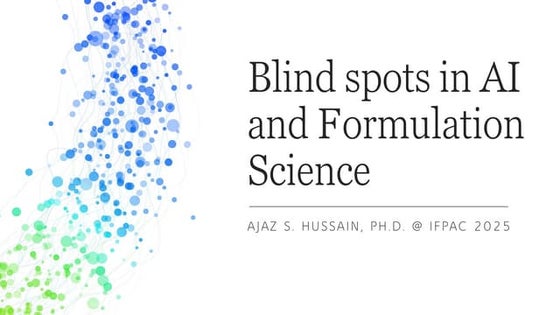



Blind spots in AI and Formulation Science, IFPAC 2025.pdfAjaz Hussain
Ěý
The intersection of AI and pharmaceutical formulation science highlights significant blind spots—systemic gaps in pharmaceutical development, regulatory oversight, quality assurance, and the ethical use of AI—that could jeopardize patient safety and undermine public trust. To move forward effectively, we must address these normalized blind spots, which may arise from outdated assumptions, errors, gaps in previous knowledge, and biases in language or regulatory inertia. This is essential to ensure that AI and formulation science are developed as tools for patient-centered and ethical healthcare.Effective Product Variant Management in Odoo 18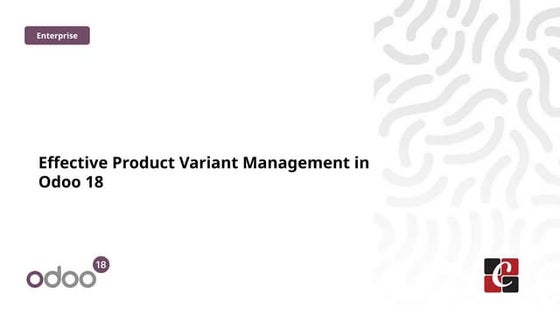



Effective Product Variant Management in Odoo 18Celine George
Ěý
In this slide we’ll discuss on the effective product variant management in Odoo 18. Odoo concentrates on managing product variations and offers a distinct area for doing so. Product variants provide unique characteristics like size and color to single products, which can be managed at the product template level for all attributes and variants or at the variant level for individual variants.Interim Guidelines for PMES-DM-17-2025-PPT.pptx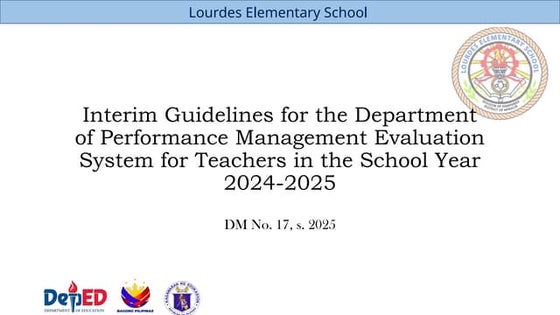



Interim Guidelines for PMES-DM-17-2025-PPT.pptxsirjeromemanansala
Ěý
This is the latest issuance on PMES as replacement of RPMS. Kindly message me to gain full access of the presentation. Full-Stack .NET Developer Interview Questions PDF By ScholarHat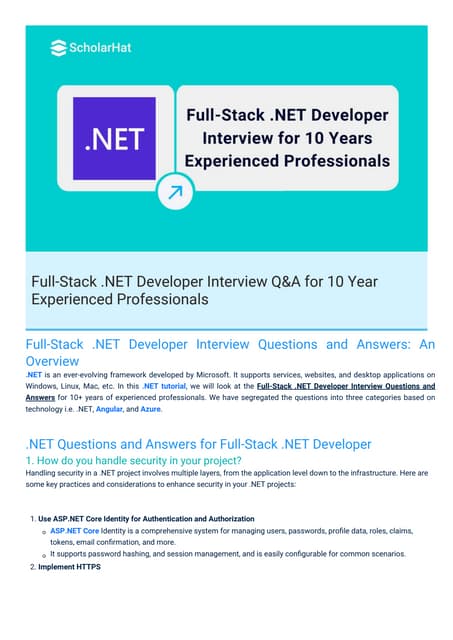



Full-Stack .NET Developer Interview Questions PDF By ScholarHatScholarhat
Ěý
Full-Stack .NET Developer Interview Questions PDF By ScholarHatDr. Ansari Khurshid Ahmed- Factors affecting Validity of a Test.pptx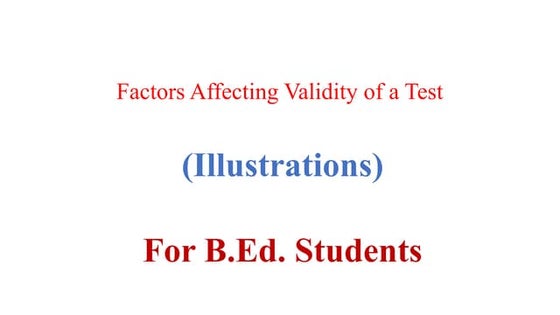



Dr. Ansari Khurshid Ahmed- Factors affecting Validity of a Test.pptxKhurshid Ahmed Ansari
Ěý
Validity is an important characteristic of a test. A test having low validity is of little use. Validity is the accuracy with which a test measures whatever it is supposed to measure. Validity can be low, moderate or high. There are many factors which affect the validity of a test. If these factors are controlled, then the validity of the test can be maintained to a high level. In the power point presentation, factors affecting validity are discussed with the help of concrete examples.How to Configure Proforma Invoice in Odoo 18 Sales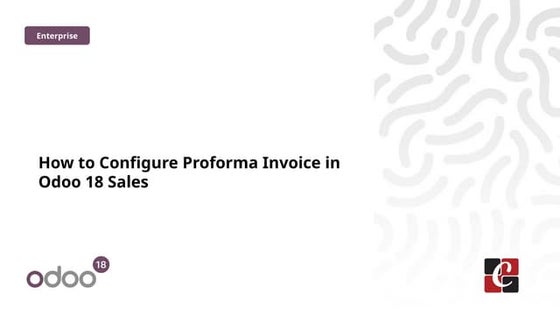



How to Configure Proforma Invoice in Odoo 18 SalesCeline George
Ěý
In this slide, we’ll discuss on how to configure proforma invoice in Odoo 18 Sales module. A proforma invoice is a preliminary invoice that serves as a commercial document issued by a seller to a buyer.Mastering Soft Tissue Therapy & Sports Taping



Mastering Soft Tissue Therapy & Sports TapingKusal Goonewardena
Ěý
Mastering Soft Tissue Therapy & Sports Taping: Pathway to Sports Medicine Excellence
This presentation was delivered in Colombo, Sri Lanka, at the Institute of Sports Medicine to an audience of sports physiotherapists, exercise scientists, athletic trainers, and healthcare professionals. Led by Kusal Goonewardena (PhD Candidate - Muscle Fatigue, APA Titled Sports & Exercise Physiotherapist) and Gayath Jayasinghe (Sports Scientist), the session provided comprehensive training on soft tissue assessment, treatment techniques, and essential sports taping methods.
Key topics covered:
✅ Soft Tissue Therapy – The science behind muscle, fascia, and joint assessment for optimal treatment outcomes.
✅ Sports Taping Techniques – Practical applications for injury prevention and rehabilitation, including ankle, knee, shoulder, thoracic, and cervical spine taping.
✅ Sports Trainer Level 1 Course by Sports Medicine Australia – A gateway to professional development, career opportunities, and working in Australia.
This training mirrors the Elite Akademy Sports Medicine standards, ensuring evidence-based approaches to injury management and athlete care.
If you are a sports professional looking to enhance your clinical skills and open doors to global opportunities, this presentation is for you.ASP.NET Interview Questions PDF By ScholarHat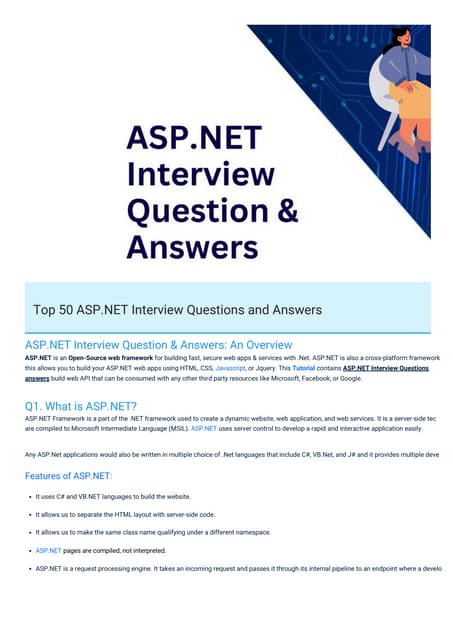



ASP.NET Interview Questions PDF By ScholarHatScholarhat
Ěý
ASP.NET Interview Questions PDF By ScholarHatRRB ALP CBT 2 RAC Question Paper MCQ (Railway Assistant Loco Pilot)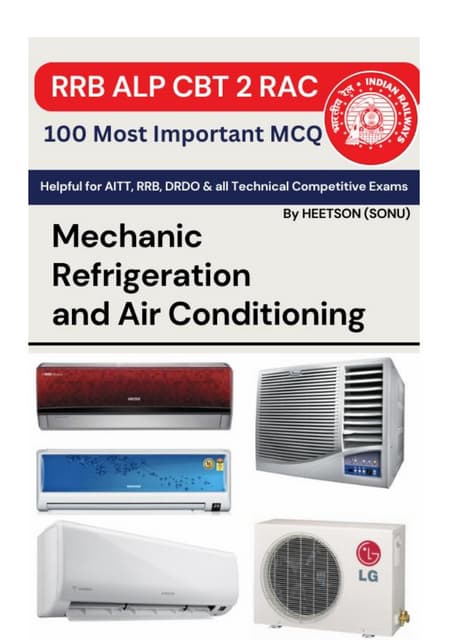



RRB ALP CBT 2 RAC Question Paper MCQ (Railway Assistant Loco Pilot)SONU HEETSON
Ěý
RRB ALP CBT 2 RAC Question Paper MCQ PDF Free Download. Railway Assistant Loco Pilot Mechanic Refrigeration and Air Conditioning Important Questions.Intellectual Honesty & Research Integrity.pptx



Intellectual Honesty & Research Integrity.pptxNidhiSharma495177
Ěý
Research Publication & Ethics contains a chapter on Intellectual Honesty and Research Integrity.
Different case studies of intellectual dishonesty and integrity were discussed.Chapter 2. Strategic Management: Corporate Governance.pdf



Chapter 2. Strategic Management: Corporate Governance.pdfRommel Regala
Ěý
This course provides students with a comprehensive understanding of strategic management principles, frameworks, and applications in business. It explores strategic planning, environmental analysis, corporate governance, business ethics, and sustainability. The course integrates Sustainable Development Goals (SDGs) to enhance global and ethical perspectives in decision-making.How to Configure Deliver Content by Email in Odoo 18 Sales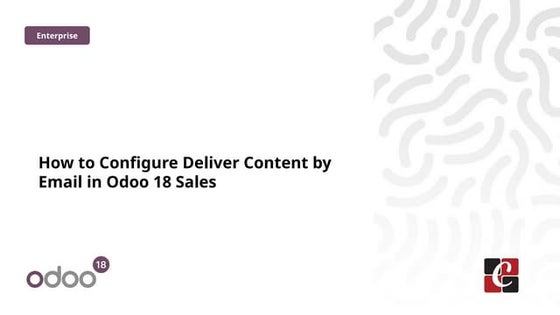



How to Configure Deliver Content by Email in Odoo 18 SalesCeline George
Ěý
In this slide, we’ll discuss on how to configure proforma invoice in Odoo 18 Sales module. A proforma invoice is a preliminary invoice that serves as a commercial document issued by a seller to a buyer.Azure Data Engineer Interview Questions By ScholarHat



Azure Data Engineer Interview Questions By ScholarHatScholarhat
Ěý
Azure Data Engineer Interview Questions By ScholarHatRRB ALP CBT 2 Mechanic Motor Vehicle Question Paper (MMV Exam MCQ)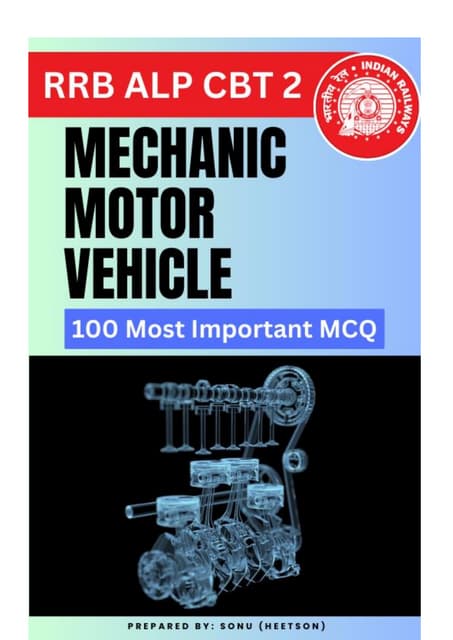



RRB ALP CBT 2 Mechanic Motor Vehicle Question Paper (MMV Exam MCQ)SONU HEETSON
Ěý
RRB ALP CBT 2 Mechanic Motor Vehicle Question Paper. MMV MCQ PDF Free Download for Railway Assistant Loco Pilot Exam.Unit 1 Computer Hardware for Educational Computing.pptx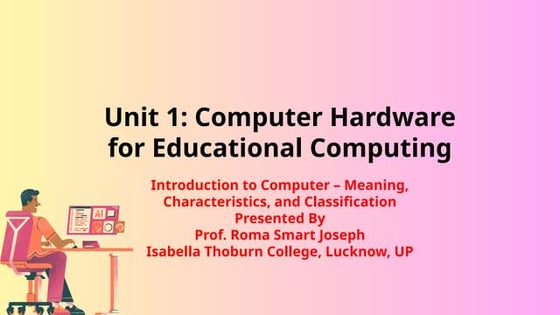



Unit 1 Computer Hardware for Educational Computing.pptxRomaSmart1
Ěý
Computers have revolutionized various sectors, including education, by enhancing learning experiences and making information more accessible. This presentation, "Computer Hardware for Educational Computing," introduces the fundamental aspects of computers, including their definition, characteristics, classification, and significance in the educational domain. Understanding these concepts helps educators and students leverage technology for more effective learning.Power of Habits.pptx
- 2. Habits, why we do, what we do • A framework for understanding how habits work • A guide to experimenting with how they might change • Change your habits, change your life • A routine, when you wake up • Habits run your life
- 3. Habits • What habits are • Why and how they form • How to change habits • Brain wants to save energy (20% of the body energy) • Cerebrum : a part of the brain is used when we learn something new • Basal Ganglia : when same actions are performed, this part of the brain takes over. • Basal Ganglia activities are reactions , not responses. Difficult to dislodge • Turn behaviour into habit, How ?? • Habit loop
- 4. Content • Habit, definition • The habit loop • Cravings • Framework for diagnosing & shaping habits
- 5. Habits, definition • Something you do regularly, often without thinking • Habits emerge because the brain is constantly looking for ways to.. 1. Save efforts 2. To fully participate in decision making 3. Divert focus to other tasks • Habit is the choice we deliberately make at some point, and then stop thinking about, but continue doing, often everyday
- 6. Habit loop
- 7. Cue > Routine > Reward • Phase 1 : Cue • First, there is cue, a trigger that tells your brain to go into automatic mode and which habit to use • Phase 2 : Routine • Then , there is routine, a behaviour or pattern, which can be physical, mental or emotional • Phase 3 : Reward • Finally, there is reward, which helps your brain figure out if this particular loop is worth remembering for the future • Cravings make habits stick
- 8. Habit loop • Cue : Get up in the morning • Routine : Drinking coffee • Reward : Caffeine, feeling fresh
- 9. Create new habits • Tie it up, something you already do • Cue : Get up in the morning • Routine : Drinking water • Reward : Feeling fresh
- 10. Changing bad habits • Same Cue & Reward • Change the routine • Quit smoking.. • Eat something you love (chewing gum), when feel like smoking • Believe that change is possible • Make public commitment • Think short term & long term rewards
- 11. Keystone habit • A habit which changes lot of other things • Eg Exercise • Be healthier, perform better at work • The habit which will impact all other habits > Keystone • Use journaling to shortlist the keystone habit • Stress is the cue, routine is alcohol, reward feel relaxed with friends • AA is successful because of this • Alcohol Anonymous • Make a list of habits which you want to change • Make a list of obstacles • Make a plan to handle those • Start small / Use willpower with strong Why / 21 days formula • Which habits are not serving me ?
- 12. Framework for diagnosing & shaping habits • Which behaviour you want to change ? • List all the steps involved in the behaviour • At the moment of the urge, switch the routine, so it delivers a different reward • As you test 4/5 different rewards, ask yourself, “Do I still feel the urge for …?” • Determine the reward you are craving



